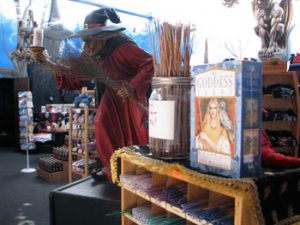Salem, Massachusetts: Witches Everywhere, Real and Fictional
Zalina Alvi goes to “witch city,” a city notorious for the Salem Witch Trials of the late 1600’s. Alvi finds Salem’s history is still present, with many memorials, Witchcraft merchandise stores, museums, and practicing witches lining their streets.

Paris is the city of lights. Los Angeles has Tinseltown. New Orleans is known for its jazz scene and Mardi Gras. And what about Salem, Massachusetts?
Salem is Witch City.
Unless you’ve been living under a very isolated and soundproof rock, you probably associate the name ‘Salem’ with ‘witch.’ And you would be right to do so.
Thanks to the notorious Salem Witch Trials of 1692, this small New England town has expanded into a veritable Mecca for all things witch-related.
Walk down any street in historic Salem and you will find witch shops, memorials, museums and tours offering a glimpse into the city’s storied past. Everywhere you turn, there are reminders that Salem is a town for witches – both real and fictional. (Case in point: Salem’s Witchcraft Heights Elementary School.)
The infamous witch hunt may have been revealed to be a tragic hoax – one that claimed the lives of fourteen women and six men – but since then Salem has attracted hundreds of practicing Witches from around the world. And its reputation as Witch City opened the door to a world of similarly themed tourist attractions.
The strange thing about Salem’s witch-mania, however, is that there are two very different sides to this coin. On one side, you have a long history of real Witches who were drawn to Salem’s history and who have found a place where they can practice their beliefs in the Craft openly.
Congregating in a handful of shops in the city’s historic center, both male and female Witches from many walks of life offer psychic readings, live spell castings and tools of the trade that include potions, crystals, gazing balls and tarot cards.
In one such shop, a second-degree priest within the Cabot Kent Hermetic Temple named John Cabot Griffin used his skills to offer insight into my aura and offered invaluable advice about my personal hopes and aspirations.
As a disciple of Laurie Cabot, known as the “Official Witch of Salem,” Griffin also stressed the importance of respecting Salem’s large Witch population.
“We all come here because this is our community, and it really is due in part to Laurie Cabot coming here and becoming an open Witch,” Griffin said.
Cabot opened the city’s first Witch shop in 1971 and continues to run a shop called The Cat, the Crow and the Crown. As the founder of the Cabot Tradition of the Science of Witchcraft and the Witches’ League for Public Awareness, she is credited with popularizing Witchcraft in the United States.
Salem, Massachusetts: Witches Everywhere, Real and Fictional
